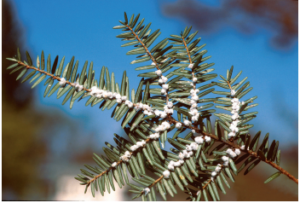Survey Your Hemlock Trees for Invasive Hemlock Woolly Adelgid This Winter

Hemlock shoot with hemlock woolly adelgid (HWA) infestation. Photo provided by MSU Extension.
After recent news of the northward spread of invasive hemlock woolly adelgid (HWA) to Ludington State Park, it is more important than ever before that hemlock trees on public and private property are checked for the invasive insect.
According to the Michigan Department of Natural Resources (MDNR) and the Michigan Department of Agriculture and Rural Development (MDARD), winter is an ideal time to check hemlocks for the invasive pest. In a recent email press release by the MDNR (released on Tuesday, Dec. 1), Robert Miller, MDARD’s invasive species prevention and response specialist, explained why winter is a good time of year to check hemlock trees for HWA infestations.
“Cooler temperatures trigger feeding activity,” Miller said. “As hemlock woolly adelgids feed, they secrete a white, waxy material that creates ovisacs. The presence of these small, round, white masses makes it possible to identify infested trees.”
Five counties in Michigan have confirmed infestations of HWA, all of which border Lake Michigan. These counties include Allegan, Mason, Muskegon, Oceana and Ottawa. During the winter months, both state natural resource professionals and local partners can be found checking hemlock trees on public land within an approximate five-mile border along Lake Michigan to identify infested trees. The location of these trees is then recorded so that they can be treated with insecticide in the summer. This treatment method has been known to successfully protect hemlock trees from further damage from HWA.
To read the DNR press release on this topic and to learn more about how you can check your hemlock trees for HWA, please click HERE .
The post Survey Your Hemlock Trees for Invasive Hemlock Woolly Adelgid This Winter appeared first on Michigan United Conservation Clubs.
Recent Posts



